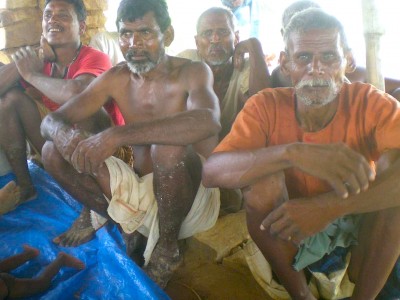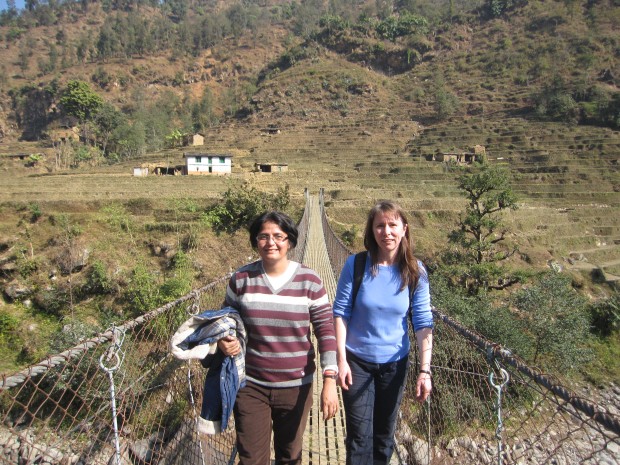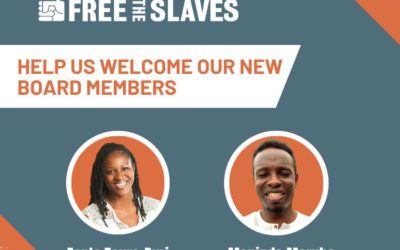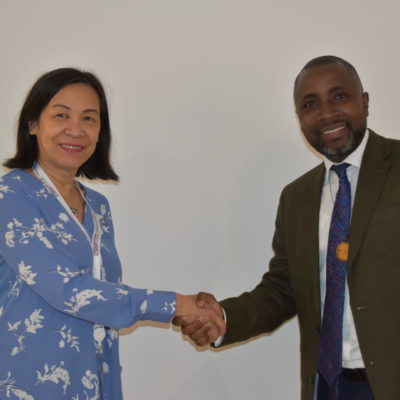FTS Associate Programs Director Ginny Baumann has never been one for the limelight. But she has always deserved it.
She helped create Free the Slaves back in 2000 – a true co-founder. And over the past 13 years, Ginny has been the principal architect of the Free the Slaves community-oriented model for change.
Ginny helped FTS build partnerships with local groups in key slavery hotspots. These groups then fanned out to impoverished and marginalized communities where slavery thrives, to educate slaves about their rights and organize them to break free.
“Every single person who has passed through Free the Slaves, whether as a staff member or intern, a donor, or staff at our grassroots partner organizations, has been touched by Ginny’s thinking, whether they know it or not — and most of them know it!” says FTS Director of Programs Karen Stauss. “Her philosophy of prioritizing the empowerment of survivors and communities at risk, rather than relying on traditional power structures to create change, has infused the organization’s approach from day one.”
Thousands have moved from slavery to freedom because of Ginny’s strategic insight and her skills as an organizational taskmaster. FTS South Asia Director Supriya Awasthi remembers the early days.
“Ten years ago, the state of Bihar looked like ‘no man’s land,'” Supriya recalls. “Ginny and I began there. We had no money, but we were dreaming big. We had passion to start from scratch, to find out why children, women, men were disappearing from their villages – how were they being trafficked and to where. Now, people in many villages are preventing trafficking in their communities, putting an end to slavery.”
“Ginny, you have always been truth, reason and inspiration for us to end slavery and spread freedom,” says activist Rajneesh Kumar Yadev of the FTS front line partner organization MSEMVS in India. “We will miss you in this journey for freedom!”
You can see Ginny’s mark on the anti-slavery movement in a new video from FTS – where she personally explains from India how community organizing led to a police raid that freed 24 teenage boys from slavery in a cookie factory.
And you can read how Ginny has been working tirelessly to get other human rights and international development professionals to recognize slavery and combat it, in her excellent article in Interaction’s Monthly Developments magazine.

Men at Rajgarh decide to break free from slavery | Photo: Ginny Baumann
Today is Ginny’s final day as a full-time staffer with FTS. But this isn’t Ginny’s final day as an abolitionist. She’ll be helping FTS and other organizations as a consultant, from her home base in the U.K.
“We are grateful for Ginny’s many years of dedicated service and her extraordinary contributions to fighting slavery across the globe,” says FTS Executive Director Maurice Middleberg.
We asked Ginny what her favorite moment has been over the past 13 years. Here’s the first thing she said: “I think that when the people of Rajgarh made their decision to walk away from the slaveholders was pretty intense (summer 2009). Being there when people decide to get free is about as good as it gets.”
Ginny completed her final staff visit a few weeks ago to villages that she has helped in partnership with MSEMVS. She wrote these notes in her field journal:
“Surrounded by these people whose resilience is so astonishing, it was obvious to me, as I go on to other work in the anti-slavery movement, that slavery will be ended. I couldn’t imagine a better end to my time in the field with FTS. But then there was just one more place MSEMVS wanted to take us to. Not 10 minutes away in our car, they showed us a village where everyone was still deep in fear and only able to meet us quickly and in secret. Here the anxiety and desperation on people’s faces spoke even more clearly than what they were saying about the violence and coercion of their lives. For the last few weeks, MSEMVS had been running an open-air classroom for the children, some of whom had been physically attacked when they tried to attend the village school. The blackboard, three rows of children, and the one teacher, who looked frankly nervous, are a precursor to the transitional school that will be set up here. Even with strangers turning up, some of the children barely stopped to give us a glance as they worked on the math questions on the board. For them, perhaps education seems like a way out of slavery, and the makeshift classroom is a first sign that freedom can be possible.”
All of us at FTS wish to express our heartfelt thanks to Ginny.
“On a personal note,” says Karen Stauss, “her kindness, her patience, her superlative integrity and diligence, and her constant willingness to educate and encourage budding as well as seasoned activists and supporters has made her a real treasure to her colleagues. While I will miss having her here daily, it makes me happy to know that her work in the anti-slavery movement will continue to change the world.”
Here’s how Supriya Awasthi sums it up: “You may not remember the time you let me go first. Or the time you dropped back to tell me it wasn’t that far to go, when I used to be in despair. Or the time you helped me at the crossroads. You may not remember any of those, but I do. And this is what I have to say to you: Today, no matter what it takes, we will still walk together to make the world slavery free.”

Supriya and Ginny on the long walk to a slavery-free world



